
Top 4 App Store Updates & How They Impact ASO in 2019
The year 2018 has been an intense year in the ASO world! We have seen lots of changes happening in both the App Store and Google Play. Let’s take a moment to review the top 4 ASO updates, which undoubtedly had an impact on your daily ASO routine. We’ll also share our 2019 ASO trends! Are you ready? Let’s go!
1. Google Play install keywords
We had to start this list with the arrival of the groundbreaking new insights provided in the Google Play Developer Console: the organic traffic breakdown from Google Play Search (keyword searches) and Google Play Explore (browse) providing insights into which keywords drive traffic and app installs. All this, with actual and real numbers!
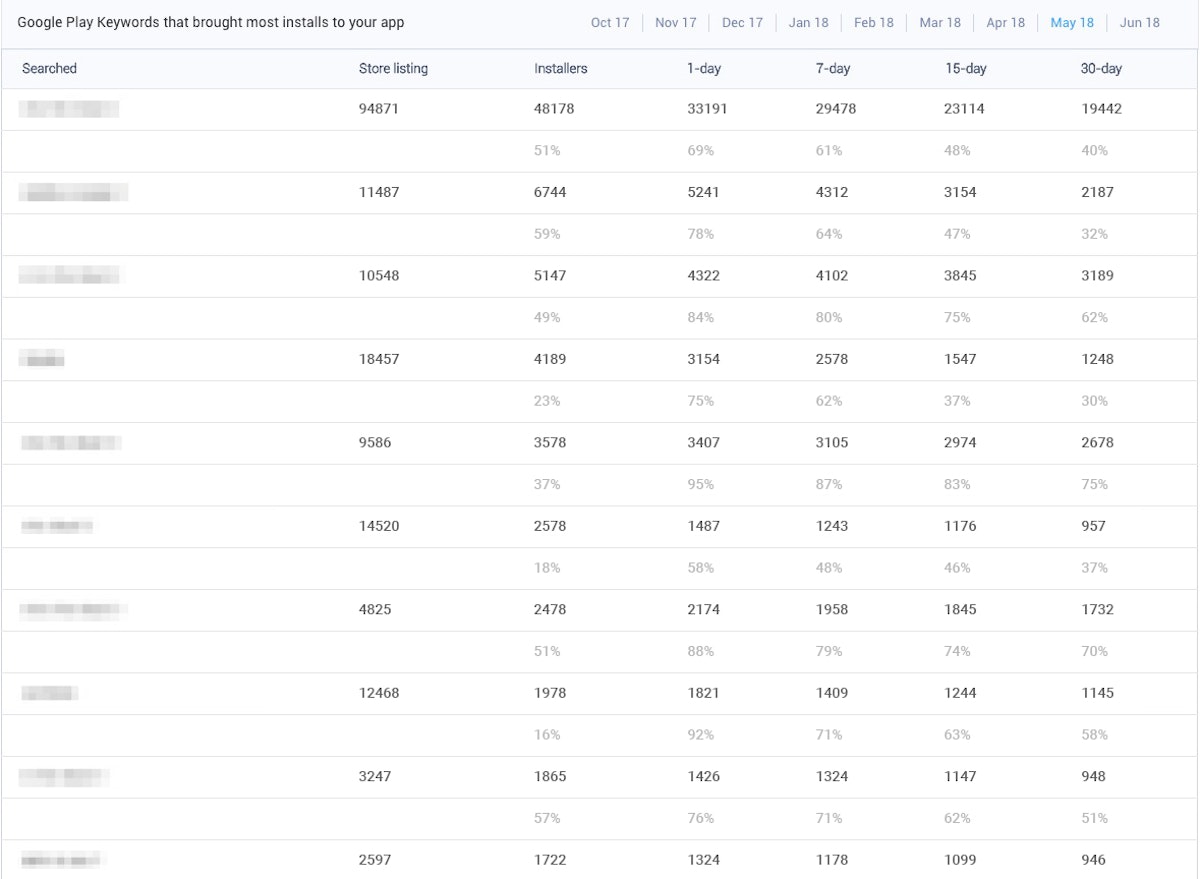
Initially, Google made this new set of data available only to a pool of publishers (beta version). The access was then entirely removed for a few months. After this emotional roller coaster, Google rolled out this feature again in August and made it available to all publishers since then. Thank you, Google!
Impact on ASO
“How many visits or installs do my indexed keywords generate to my app?” or “What is the retention rate of those installs?” Do these questions sound familiar?
One of the biggest challenge we’ve faced for years with ASO is the ability to measure and monitor its real impact, especially in terms of keywords and user acquisition coming from store search.
Until recently, the only way to gauge the potential and worthiness of a keyword was to rely on store popularity indicators (e.g. Apple Search Popularity) but no information was ever disclosed on real traffic numbers.
With the new data provided by Google, you can now see which keywords drive the most visitors to your Play Store listing and which convert best with the real number of impressions and installs per keyword!
This long-awaited news was obviously warmly welcome by the ASO community. It enables marketers to refine their ASO strategy and to focus on targeting converting search terms, bringing the most traffic and installs.
How AppTweak reacted
Reactivity is our main priority. We constantly update our features and algorithms with the most recent store data and trends.
Back in June 2018, AppTweak made Play Store Install Keywords Official Data available to everyone, even though Google only made it only available to a small pool of beta users.
Furthermore, we’ve added two unique functionalities that are still not available on Google. With AppTweak, you can now:
2. iOS 12
The public launch of iOS 12 arrived on 17 September 2018. As outlined in our iOS 12 Update recap, iOS 12 was not as disruptive as iOS 11 had been in terms of ASO.
However, a few changes are worth mentioning as they could predict bigger upcoming updates from Apple in the future.
Generally, the App Store users now get a much more personalized experience in the store.
For instance, on iOS 12, the “Today” tab features daily stories and apps or games based on store search behavior and apps that are already installed (or have been installed) by the user.
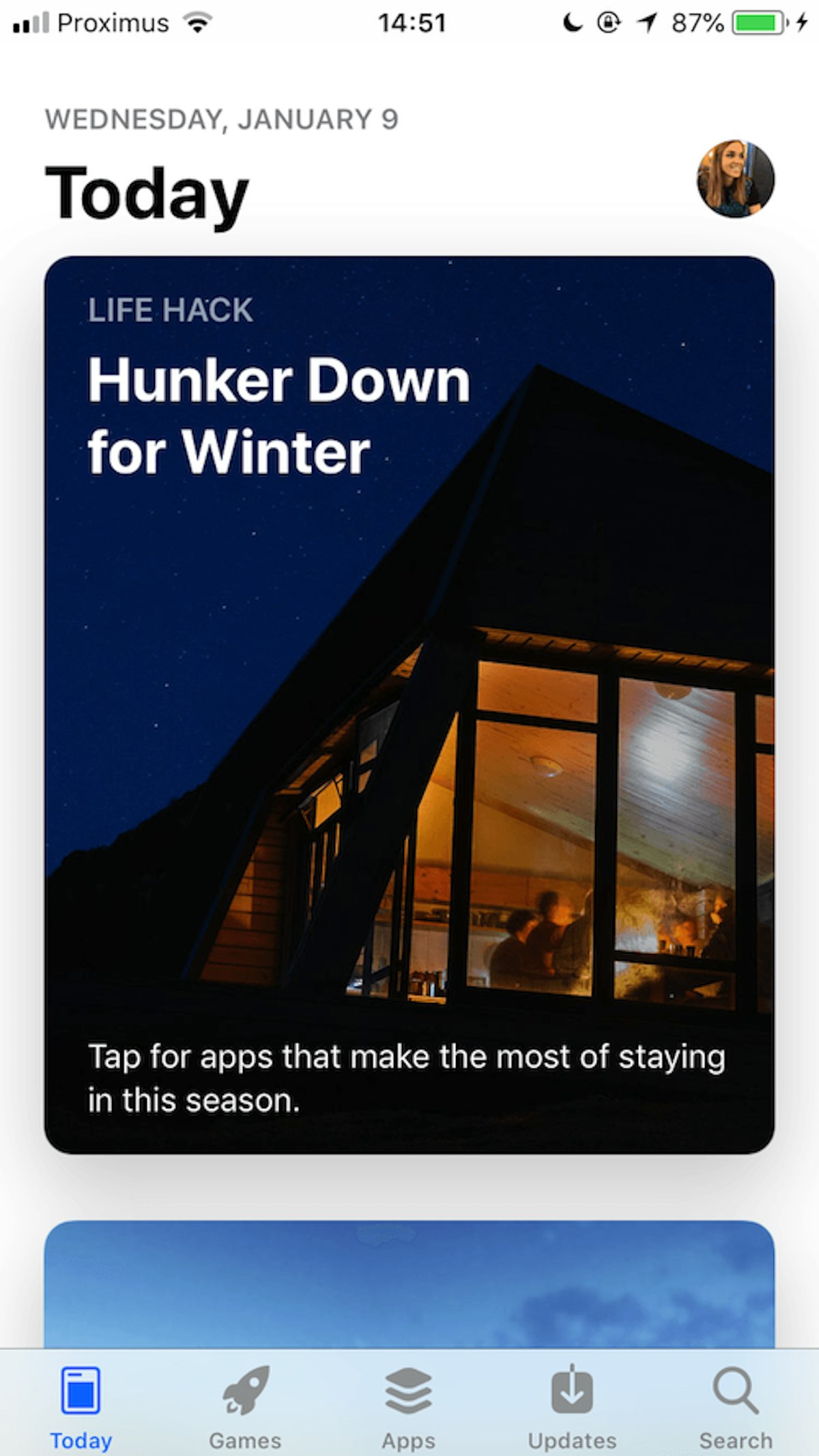
Apple’s purpose is to provide users with rich content that they might like and be interested in, tailored to their personal taste and preferences. Sounds familiar? This does start to look more and more like some sort of social media “feed” where users can spend even more time browsing through visual and entertaining content in the App Store.
iOS 12 adoption rate actually took only 23 days to hit up the 50%, making its progression two times quicker than iOS 11 adoption.
Impact on ASO
Personalization is becoming increasingly important and will most likely go even further and more precise in the future.
If it provides users with a greater experience, it does however make the app marketer’s job a little harder.
Indeed, getting to the front of the App Store’s recommendations or getting an app featured is now becoming more challenging and gets harder to control (and measure!).
However, once an app or story actually is displayed, its chances to convert and retain are higher than before given the higher quality and relevance of the content, better matching the user’s profile and interests.
Lastly, another update brought by iOS 12 that is worth mentioning was the permission to use emojis.
Announced back in June 2018 (WWDC), Apple developers were to be allowed to use emojis in their app metadata. It was indeed possible to do so in the iOS 12.1 beta version, but Apple has reportedly revoked this opportunity. We’ll keep you updated on the situation.
Learn about Google Play’s metadata policy changes
How AppTweak reacted
We’re making great progress towards better understanding how personalization affects the App Store and search results.
We’ve also seen that Search Ads were also now potentially displayed and prioritized according to the users’ profile and behavior. Although it makes our job harder to calculate the Share of Voice (SOV) data, it opens up a whole new set of possibilities and insights that we can dig into. Stay tuned!
3. Search Ads’ impact on ASO & new countries available
We couldn’t wrap 2018 up without talking about Search Ads and their impact on ASO.
Search Ads allow app developers to bid (pay) on specific keywords or key phrases so that their app appears 1st in the search results on that/those terms (before the organic search results). One ad is displayed at a time, highlighted in light blue with the “ad” symbol.
-1.png?auto=format,compress&q=75&w=1200)
Search Ads Basic or Search Ads Advanced: Which one to choose?
Given that over 65% of app downloads are made within the App Store directly, Search Ads were long-awaited by app marketers, willing to have more opportunities to showcase their app(s).
Their success has been imminent and, today, Search Ads represent a powerful user acquisition channel for many mobile companies.
Since their launch back in 2016 (only available in the US at first), Apple has progressively been adding more and more regions to its Search Ads programme.
Today, Search Ads are available in 13 storefronts namely (by order of availability):
- United States (October 2016)
- United Kingdom, Australia, New Zealand (April 2017)
- Canada, Mexico, Switzerland (October 2017)
- France, Germany, Italy, Japan, South Korea, Spain (July 2018)
Discover our methodology to build your Search Ads strategy in new ASA markets
Impact on ASO
Search popularity
First of all, for all Search Ads available storefronts, Apple discloses the keyword “Search Popularity” (exponential 5-100 indicator revealing how “popular” a given keyword or key phrase is). This indicator aims to help marketers make better decisions on which keywords to bid on.
Obviously, this indicator is also truly helpful for organic keyword optimization. Indeed, before the Search Popularity was made available, app marketers had no visibility on keyword search traffic and had to rely on less meaningful indicators to optimize their keywords. (web volume; etc.).
Even though we are still waiting for Apple to provide precise search data (such as Google Play Install Keywords), today Apple’s Search Popularity is the best way to gauge and understand which keywords drive traffic in the App Store.
Discover the most searched App Store keywords of 2018
With Apple opening up Search Ads to more and more countries, Search Popularity is now available in most major Western languages and parts of Asia: English, French, German, Spanish, Italian, Japanese, and Korean.
On a side note, Apple announced in December 2018 the arrival of new supported languages in the App Store: Catalan, Croatian, Czech, Hindi, Hungarian, Polish, Romanian, Slovak, and Ukrainian.
We are clearly seeing major efforts from Apple to help app developers better localize their product pages and store listings. App localization is a great way to drive more organic downloads and it has shown impressive results if done properly.
We’re now waiting for Apple Search Ads to support more countries so that we can fetch the Search Popularity in more languages on AppTweak!
Check out this insightful webinar on the tips and strategies for Apple Search Ads keywords
Organic keyword rankings boost
We’ve identified another interesting impact of Search Ads on ASO. Here’s what we’ve found:
- The moment your app is displayed as an ad on a keyword for which you’re ranking organically below #8 that same moment → your app will be promoted organically to the 8th position.
- The moment your app is displayed as an ad on a keyword for which you’re ranking organically in the top 8 that same moment → your organic ranking will remain the same.
- If you’re placing an ad on a keyword for which you’re not ranking organically, you won’t benefit from any organic boost and will stay unranked in the organic search results.
You can therefore keep this in mind while choosing your Search Ads keywords, as you could benefit from a “double chance” to drive downloads on terms for which you rank poorly organically.
Curious about this Search Ads trick? Watch our Search Ads Webinar!
How AppTweak reacted
Back in October 2016, AppTweak was the first ASO tool providing with the exact Search Popularity indicator. We remember that time like it was yesterday!
Today, we have proven that this wasn’t a one-time effort. We consistently kept updating our Search Popularity indicators as soon as Apple made new countries available (kudos to our dev team!).
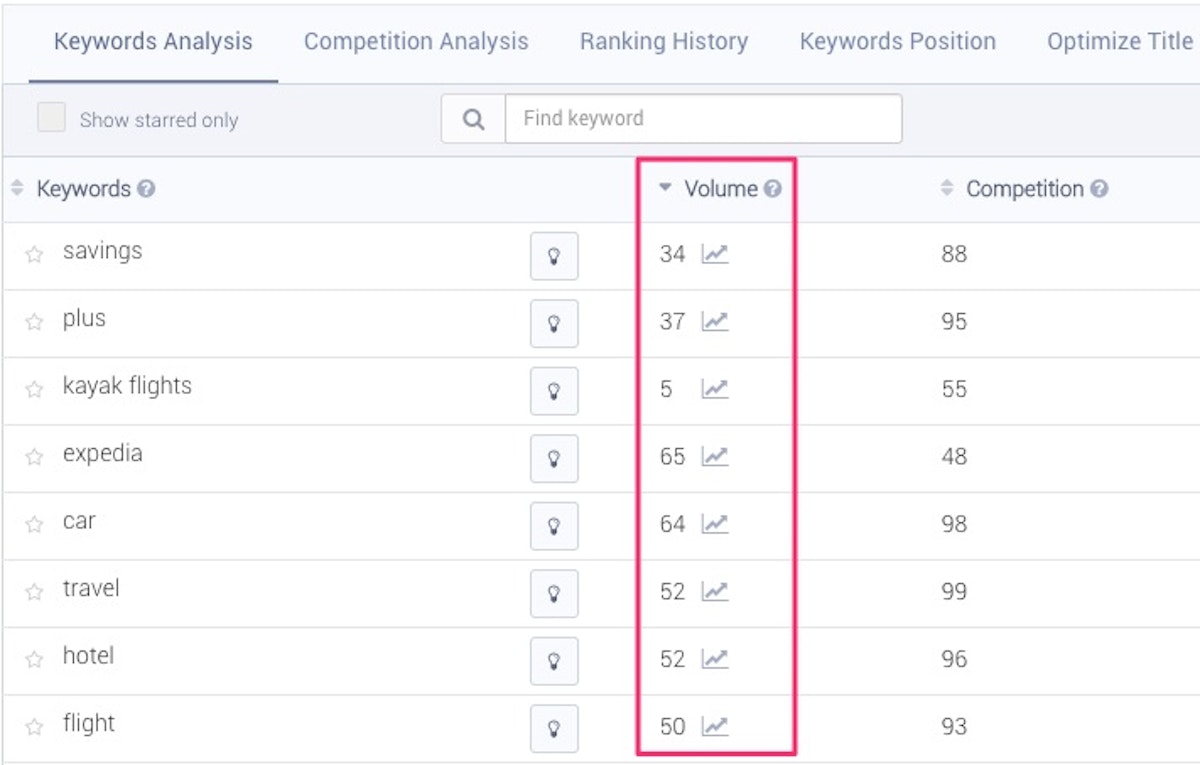
_AppTweak offers Apple’s Search Popularity (=Volume) in all available storefronts.
_As mentioned before, we’re also working hard on trying to understand the latest changes and behaviors within Search Ads (results based on behaviors and pre-installed apps). We’ll keep you updated on this!
4. Stores algorithms updates
2018 has also been rich in algorithm changes as we’ve observed quite a few keywords dance on both the App Store and Google Play.
More generally, it seems that Google has been the most unstable, already known for updating its algorithm more often than Apple.
Looking at the whole year (Jan 1, 2018 – Jan 1, 2019) in the United States, for instance, we can see that throughout the year, Google Play keyword rankings were affected by multiple algorithm changes.
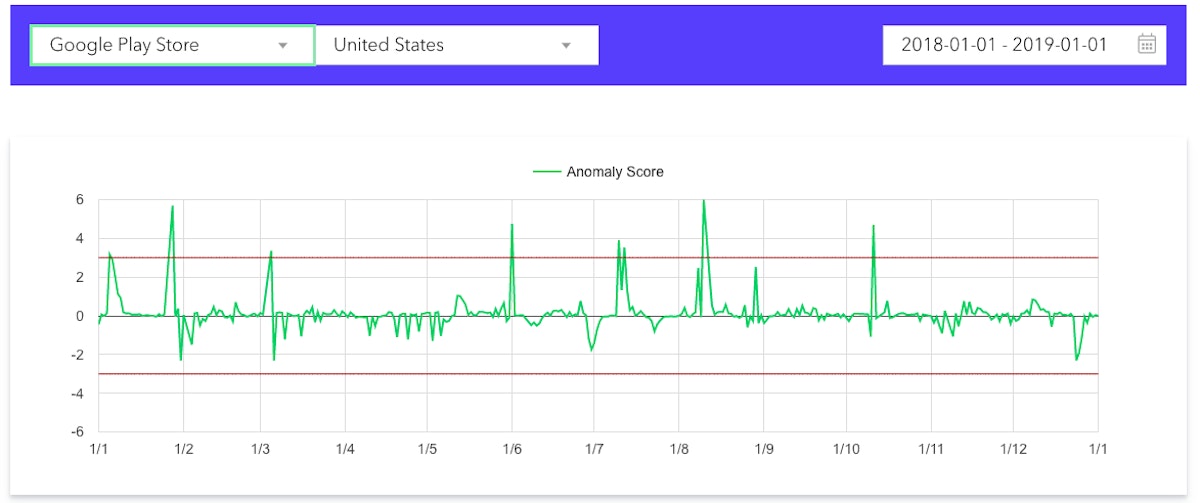
Check out AppTweak’s Algorithm Change Detector feature
On the App Store, we have identified 5 major search algorithm updates which impacted keyword rankings on many apps.
The latest update occurred on December 30th and 31st, which affected the US, UK, Germany, France, Australia, Russia, South Korea, and Taiwan.
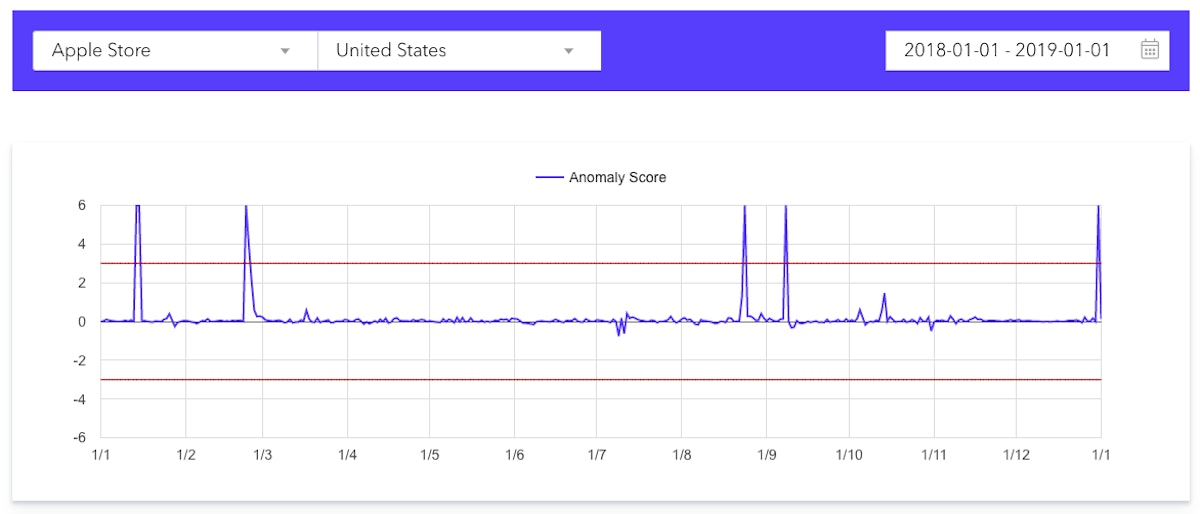
Want more details on algorithm changes? Check out the ASO Stack by Phiture
Impact on ASO
Some of these updates were temporary; others seem more permanent. For some apps, those changes have been positive and their keyword rankings actually increased. On the other hand, another portion of apps saw their keyword rankings decrease considerably.
It is always challenging to fully understand to which extent the rankings will be affected and which algorithm components have been updated by either Apple or Google (“black box”).
Both Apple and Google aim at improving their users experience in the store as much as possible. Overall, it seems that the rule of thumb is to improve search results relevance and “clean” the stores from poor quality apps.
Various factors that were reportedly impacted by algorithm updates:
- Poor reviews and/or ratings
- Low conversion and/or retention rates
- Small amount of downloads and low download velocity
- Low user engagement
- Technical flaws (excessive crash rate; slow rendering; poor battery management)
- High uninstall rate
How AppTweak reacted
Given the increasing number of store updates and the amount of data we collect daily on AppTweak, we’ve decided to put together our own algorithm which could detect when both Apple and Google launch a search algorithm update.
Basically, we’ve developed an anomaly score that monitors the keyword ranking changes and detects if there is any unusual movement.
Try our unique (and free) Algorithm Change Detector!
2019 ASO trends
Over the past few years, both Apple and Google have shown their will to provide their users with a better general store experience.
Apple keeps pushing the App Store towards more personalized and richer content while Google adjusts regularly its search algorithm.
Simultaneously, throughout 2018, we’ve seen many new apps and games emerging or booming, offering more quality, creativity and interactivity to their users.
Read more about the most popular apps & games in 2018
Conclusion
With the stricter store guidelines from both Apple and Google, as well as the increasing number of quality apps, app discoverability becomes more challenging than ever before.
ASO in 2019 will, therefore, become more important than ever. It seems that most app developers and marketers understood today that they should dedicate enough time and resources on optimizing their store listings.
As usual, it is important to remember that ASO is an ongoing process, requiring multiple iterations and frequent updates based on store changes, using accurate data and regular performance analysis.
At AppTweak, we’re very excited to keep working hard on improving our features and data to help you crush your ASO strategy in 2019!

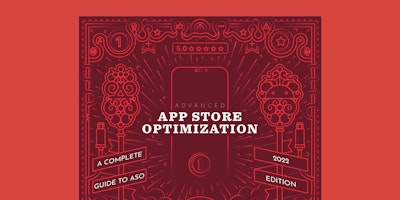
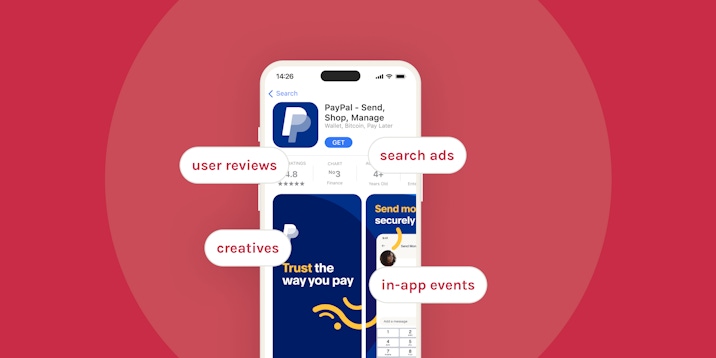
 Sukanya Sur
Sukanya Sur
 Simon Thillay
Simon Thillay
 Justin Duckers
Justin Duckers
 Georgia Shepherd
Georgia Shepherd

 Marcos Barceló
Marcos Barceló